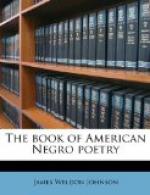We do not think the black woman suffers much by comparison with the white. Thomas Jefferson said of Phillis: “Religion has produced a Phillis Wheatley, but it could not produce a poet; her poems are beneath contempt.” It is quite likely that Jefferson’s criticism was directed more against religion than against Phillis’ poetry. On the other hand, General George Washington wrote her with his own hand a letter in which he thanked her for a poem which she had dedicated to him. He, later, received her with marked courtesy at his camp at Cambridge.
It appears certain that Phillis was the first person to apply to George Washington the phrase, “First in peace.” The phrase occurs in her poem addressed to “His Excellency, General George Washington,” written in 1775. The encomium, “First in war, first in peace, first in the hearts of his countrymen” was originally used in the resolutions presented to Congress on the death of Washington, December, 1799.
Phillis Wheatley’s poetry is the poetry of the Eighteenth Century. She wrote when Pope and Gray were supreme; it is easy to see that Pope was her model. Had she come under the influence of Wordsworth, Byron or Keats or Shelley, she would have done greater work. As it is, her work must not be judged by the work and standards of a later day, but by the work and standards of her own day and her own contemporaries. By this method of criticism she stands out as one of the important characters in the making of American literature, without any allowances for her sex or her antecedents.
According to “A Bibliographical Checklist of American Negro Poetry,” compiled by Mr. Arthur A. Schomburg, more than one hundred Negroes in the United States have published volumes of poetry ranging in size from pamphlets to books of from one hundred to three hundred pages. About thirty of these writers fill in the gap between Phillis Wheatley and Paul Laurence Dunbar. Just here it is of interest to note that a Negro wrote and published a poem before Phillis Wheatley arrived in this country from Africa. He was Jupiter Hammon, a slave belonging to a Mr. Lloyd of Queens-Village, Long Island. In 1760 Hammon published a poem, eighty-eight lines in length, entitled “An Evening Thought, Salvation by Christ, with Penettential Cries.” In 1788 he published “An Address to Miss Phillis Wheatley, Ethiopian Poetess in Boston, who came from Africa at eight years of age, and soon became acquainted with the Gospel of Jesus Christ.” These two poems do not include all that Hammon wrote.
The poets between Phillis Wheatley and Dunbar must be considered more in the light of what they attempted than of what they accomplished. Many of them showed marked talent, but barely a half dozen of them demonstrated even mediocre mastery of technique in the use of poetic material and forms. And yet there are several names that deserve mention. George M. Horton, Frances E. Harper, James M. Bell and Alberry A. Whitman, all merit consideration when




